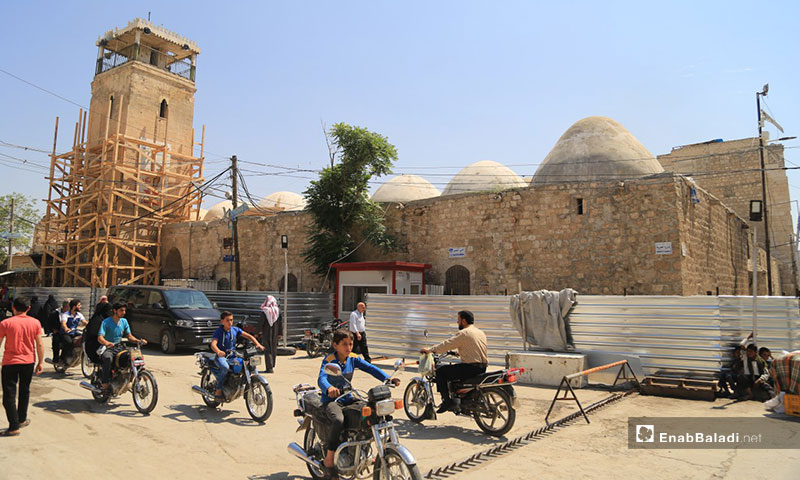



The al-Bab City’s Local Council, in cooperation with the Türkiye Diyanet Vakfı/Turkey’s Religious Endowment, is working on the renovation of the Grand Mosque/al-Masjid al-Kabir, considered one of the greatest historical monuments in the city.
The renovation process covered the restoration of the mosque’s walls, its yard and façade, including its columns, domes, taps and fountains.
The mosque, through history, was vulnerable to several crisis and concussions that rendered it cracked, which became more critical in the Syrian war during the confrontations with the Islamic State/IS, which controlled the city of al-Bab between 2013 and 2017.
Enab Baladi interviewed Mahmoud al-Hajj Aqeel, the official of social affairs and endowments of the al-Bab City Local Council, who narrated the history of the city of al-Bab, the importance of the Grand Mosque and the stages of the renovation process.
Aqeel pointed out that the city of al-Bab is a historical ancient city, dating back to the Romanian era. It was controlled by Ḥabīb ibn Maslama al-Fihrī during the reign of caliph Umar ibn Al-Khattāb in the 16th Hijri year’s conquests. The city is a house to many historical anecdotes and archeological sites, which belong to the Umayyad and Ottoman eras.
Aqeel said that the most important archeological site that the city is famous for is the al-Masjid al-Kabir/Grand Mosque, also called the al-Omari Mosque, constructed in 717 AD during the Umayyad era by Caliph Al-Walid ibn Abd al-Malik and then Hisham ibn Abd al-Malik.
Throughout history, the mosque suffered numerous fires and cracks, the last of which happened during the confrontations with the Islamic State/IS.
He added that after the Islamic State was repelled from the city, the local council, in cooperation with the Türkiye Diyanet Vakfı/Turkey’s Religious Endowment, started working on the renovation of the mosque, as to give it its Umayyad era’s shape back and preserve its archeological status.
He explained that each of the mosque’s stones was given numbers, as to be restored to its original place after it is maintained and renovated, which will revive the mosque’s original glamour and historical identity, as he put it.
The renovation process, according to Aqeel, has started about a year ago and is yet ongoing. The mosque is expected to be reopened and the first prayer is to be held there on the upcoming Eid al-Adha.
In August 2016, Turkey launched the Operation Euphrates Shield in Northern Syria, announcing that it is for the protection of its borders from the Islamic State. The operation ended in March 2017 with Turkey’s control over areas in rural Aleppo, starting from Jarabulus to Azaz, as far az al-Bab.
In the Euphrates Shield’s control areas, western and northern rural Aleppo, local councils are working on implementing service, developmental and relief projects with the support of the Turkish government.
if you think the article contain wrong information or you have additional details Send Correction